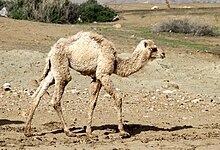Camelid
| Camelid | |
|---|---|

| |
| A Bactrian Camel walking in the snow | |
| Scientific classification | |
| Kingdom: | |
| Phylum: | |
| Class: | |
| Order: | |
| Suborder: | |
| Family: | Camelidae Gray, 1821
|
| Genera | |

| |
| Map of the world showing distribution of camelids. Solid black lines indicate possible migration routes. | |
Camelids are a group of even-toed ungulate mammals. They form the family Camelidae. There are six living species of camelids.

Taxonomy[change | change source]
- Camelidae
The animals of the genus Camelus are also called Afro-Asiatic Camelids. The animals of the genus Lama and genus Vicugna are also called South American Camelids.
Hybrid[change | change source]
There also exists a camelid hybrid called a Cama. It is the child of a female Llama and a male Dromedary Camel. The Cama does not exist in nature, but is "made" by humans through artificial insemination (that means the sperm is artificially put into the female).
Habitat[change | change source]
The two Camelus species originally lived in northern Africa, south-west and eastern Asia. The other four camelids lived in South America.
Camelids and humans[change | change source]
Camelids have been domesticated by humans for about 5000 years. They have been important for transport, but were also kept for wool, meat and milk. The llama and alpaca were very important for the South American cultures, like the Inca. The camels were used by people in north Africa and Asia, especially in deserts.
